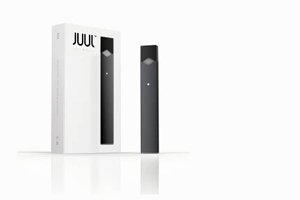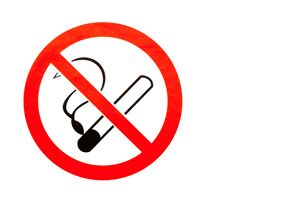The Israeli Ministry of Health has come out in favor of banning the marketing of the e-cigarette Juul, according to a story by Adrian Filut and Lilach Baumer for Calcalist, quoting officials at the ministry.
The decision about whether such a ban is introduced now hinges on its receiving a stamp of approval from the country’s attorney general.
A report in the Ha’aretz newspaper, meanwhile, suggested that the ban would apply to ‘nicotine-rich electronic cigarettes like [presumably meaning such as] the popular Juul’.
The Calcalist story said that sales of Juul, which was launched initially in the US in 2015, had gained momentum during the past 12 months. ‘According to a CNBC article citing data by market research firm Nielsen published Saturday, Juul’s sales have shot up almost 800 percent over the past year and the company now controls around 71 percent of the US e-cigarette market,’ it said.
Juul was launched in Israel in May and in the UK in July. The product’s consumable pods sold in Israel are rated at 5 percent nicotine, while those sold in the UK are rated at 1.7 percent, to comply with European regulations.
Grant Winterton, Juul Labs’ president for Europe, the Middle East and Africa, told Reuters last month that the UK had been chosen as Juul’s third market after the US and Israel, partly because it had the world’s “most supportive government” when it came to encouraging smokers to vape. Also on the radar were said to be France, Germany and Italy.
Israel, on the other hand, seems opposed to reduced-risk products in general. In March, the Knesset’s Finance Committee approved a measure to tax heated-tobacco products such as Philip Morris International’s IQOS at 65 percent of the retail price, in line with the tax on cigarettes.
Tag: Israel

Israel looks to ban Juul

Advertising bill scuttled
Israel’s ministerial committee for legislation yesterday scuttled a bill that would have banned most tobacco-products advertising, according to a story in Arutz Sheva (IsraelNationalNews.com).
The bill, which would have embraced electronic cigarettes, would have excluded advertisements in printed newspapers, though newspapers would have been required to print anti-smoking messages of the same size as the advertisements alongside the advertisements.
The decision to torpedo the bill enraged Yehuda Glick, a member of the Knesset.
He alleged that the Government had succumbed to the interests of the media, which would have lost considerable sums from the loss of tobacco advertising, and the major tobacco companies.
“The Israeli Government is addicted to, bought by, and works for the tobacco companies,” charged Glick.
“The government never intended to approve the law. The postponement of the smoking products bill in the ministerial committee, after the law passed through my committee for first reading, is crossing a dangerous red line of government service for tobacco tycoons.”
Glick has made fighting smoking a major cause of his in the Knesset and recently ended a 25-day hunger strike he said was designed to pressure the government into raising taxes on rolling tobacco.
Pyrrhic victory
The Israeli Knesset’s Finance Committee has approved a measure to tax heated-tobacco products such as Philip Morris International’s IQOS at 65 percent of the retail price, in line with the tax on cigarettes, according to a story by Chana Roberts for Arutz Sheva, relayed by the TMA.
Anti-smoking groups Avir Naki and Smoke Free Israel, and bipartisan members of the Knesset (MK), had been lobbying the Finance Minister Moshe Kahlon and the Finance Committee head Moshe Gafni to tax these products.
The groups and the Likud MK Yehuda Glick had asked the Supreme Court to force Kahlon to tax IQOS as cigarettes “until there is substantial, and substantiated, proof that IQOS are not as harmful as regular cigarettes.”
The new tax is expected to generate NIS120 million (US$34. million) annually.
Meanwhile, PMI was said to have emphasized that the company would concentrate on ‘rolling tobacco’ instead of products claimed to be a ‘better alternative’ to regular cigarettes.
Study is a ‘wakeup call’
A new Tel Aviv University (TAU) study published in Addiction finds that eight out of 100 smokers who take smoking cessation medications will have benefited from taking such medications after one year’s time, according to a story in medicalxpress.com.
The researchers conclude that this is a low rate of success that should encourage policymakers to try to find better methods to help smokers quit, and to prevent young people from taking up smoking.
“By the end of the first year of intervention, only eight out of 100 smokers will have abstained from smoking due to the smoking medication,” said lead researcher Dr. Laura J. Rosen of the School of Public Health at TAU’s Sackler Faculty of Medicine.
“This study is particularly important in Israel, where 22.5 percent of adults smoke and the rate of smoking is not declining. While the Israeli national healthcare system offers a strong package of aid to smokers who want to quit, there is no permanent funding for other tobacco control strategies.”
The scientists used meta-analysis to combine the results of 61 randomized controlled trials involving some 28,000 participants who took the first-line US Food-and-Drug-Administration-approved smoking cessation medications bupropion (Zyban), nicotine replacement therapy (NRT) or varenicline (Chantix/Champix). In all of the trials, participants were randomized either to an intervention group, which received smoking cessation medications, or to a control group, which did not receive active medications. Most of the trials also featured some form of counseling in addition to the medication.
“Less than 40 percent of those receiving the medications continued to abstain from smoking after three months, about 25 percent had still quit after six months, and about only a fifth — 20 percent — remained abstinent after a full year,” Rosen says. “Importantly, 12 percent of those who did not receive active medication continued to abstain from smoking after one year.
“Because benefit is calculated by starting with the quit rate among those who received the medication, and subtracting from the percentage who quit in the groups which didn’t receive the medication, just eight percent of smokers who received smoking cessation medications continued to benefit from the drugs after one year.”
According to Rosen, this study differs from previous meta-analyses in that it examines the relative success of quitting over different time periods (three, six and 12 months) and the overall decline in benefits from the medication over time.
“This study is a wakeup call for policymakers everywhere and for physicians who treat smokers,” Rosen concludes. “Much more needs to be done to reduce tobacco use and its enormous toll on the population. We applaud current efforts by the FDA to develop more beneficial forms of medicinal nicotine for smokers who want to quit. Policymakers should use all possible means to prevent young people from starting to smoke. Prevention of entry into the cycle of addiction is the best possible medicine.”
The full story is at: https://medicalxpress.com/news/2018-01-benefits-cessation-medications-diminish.html
Hard times for smokers
Already an ‘endangered species’ in the public realm, life will get even more difficult for smokers if Israel’s Health Minister Rabbi Yaakov Litzman has his way, according to a story by Dror Halavy for Hamodia.
Litzman is said to be seeking to impose more restrictions on smokers, including banning tobacco smoking from places where it is currently permitted, increasing taxes on cigarettes and other tobacco products, and imposing bigger fines on people who smoke where smoking is banned.
Smoking in public was banned nearly a decade ago, with smokers restricted to specific areas of restaurants, bus stations, places of entertainment, banks, malls and offices.
Under current rules, the proprietors of establishments that choose to allocate spaces for smokers must ensure that no second-hand smoke escapes to bother non-smokers.
Setting up such spaces is not mandatory, and many businesses and offices ban smoking on their premises altogether.
The new regulations proposed by Litzman would ban such smoking areas, and that ban would apply also to open-air venues, such as stadiums.
Smoking outdoors would be banned within 10 meters from the entrance to a building.
Under Litzman’s proposals, more inspectors would be hired to ensure that no smoking takes place in hospitals, or government and public institutions, and fines for violating smoking bans would be increased.
In addition, tobacco companies that advertise their products in newspapers or online (advertising in broadcast media was banned more than a decade ago) would be required to place public notices of the same size pointing out the dangers of smoking.
Also banned would be toys or food that resemble tobacco products (such as candy cigarettes or cigars), and companies would be banned from distributing free cigarettes.
Halavy’s story is at: http://hamodia.com/2017/07/23/new-rules-make-life-even-harder-smokers/.

Prosecutions sought
In a letter sent on June 20 to Israel’s Attorney General Avichai Mandelblit, members of the Knesset Yehudah Glick and Yoel Hasson called for the criminal prosecution of cigarette companies, according to a story in the Jerusalem Post relayed by the TMA.
The politicians argued that cigarette companies were continuing to produce and market cigarettes in the country, even though they ‘have known for decades that their products have caused and cause an unthinkable number of fatalities’.
Tobacco use in Israel had increased by 13 percent in one year, driven by low taxes on roll-your-own tobacco and vigorous marketing of smokeless and other tobacco products, the politicians said.
Tobacco use was responsible for more than 8,000 deaths in the country every year.
The companies’ actions were “actually an attack on Israeli residents” and “[o]ur purpose is to prevent the destructive consequences of this attack,” they said.

Smoking incidence on rise
The incidence of smoking among Israeli residents aged over 18 increased from 19.7 percent in 2015 to 22.5 percent last year, according to a story in Ha’aretz relayed by the TMA.
The increase means that the number of smokers in Israel rose by about 120,000 to about 1.2 million.
According to figures released on June 1 by the Israeli Health Ministry, 2016 was the third straight year in which the incidence of smoking had increased.
Among Israeli men, the incidence of smoking was 31.1 percent last year, while it was 15.8 percent among women.
Twenty-three-point-four percent of Israeli Arabs and 22.3 percent of Israeli Jews were smokers last year.
But the incidence among Arab men was 43.9 percent, 1.6 times the rate among Jewish men, while the incidence among Arab women was 9.8 percent and that among Jewish women was 17.7 percent.
The smoking incidence declined among male soldiers from 30.6 percent in 2012 to 24.8 percent in 2016, and it fell among female soldiers from 23.3 percent to 14.9 percent during the same period.
Meanwhile, the number of Israelis who enrolled in stop-smoking programs was said to have risen by four percent last year.
Health Minister Yaakov Litzman has said he will introduce shortly a package of measures aimed at reducing smoking rates, including a possible tax hike on roll-your-own tobacco.
Israel imposes a much lower tax on cut tobacco than on cigarettes, which is said to have led to a rise in the consumption of RYO cigarettes in the country.
The health ministry estimates that smoking claims about 8,000 Israeli lives annually and costs the economy 12.9 billion shekels (US$3.6 billion), or 1.5 percent of the country’s gross domestic product.
iQOS under scrutiny in Israel

Photo by Genista 
Israel’s sole cigarette manufacturer, Dubek Ltd., has filed a lawsuit in the High Court of Justice claiming that the Health Ministry is showing ‘favoritism’ by allowing Philip Morris International to market its heat-not-burn device, iQOS, on the domestic market, according to a story by Judy Siegel-Itzkovich for the Jerusalem Post, relayed by the TMA.
Dubek says that this is in violation of the law that restricts the advertising and marketing of tobacco products.
It says also that the Tax Authority does not levy sales taxes on iQOS, causing ‘a huge loss of revenue to the state coffers’.
The Health Minister, Ya’acov Litzman, reportedly said that the government would not regulate the sale of iQOS until the ‘FDA’ had ruled that the product was harmful.
Meanwhile, the Israel Medical Association’s Society for the Prevention of Smoking and Smoking Cessation said PMI had chosen Israel to be among the first countries to market iQOS, thus turning its population into ‘guinea pigs’ in a ‘huge experiment for which we will all pay’.









